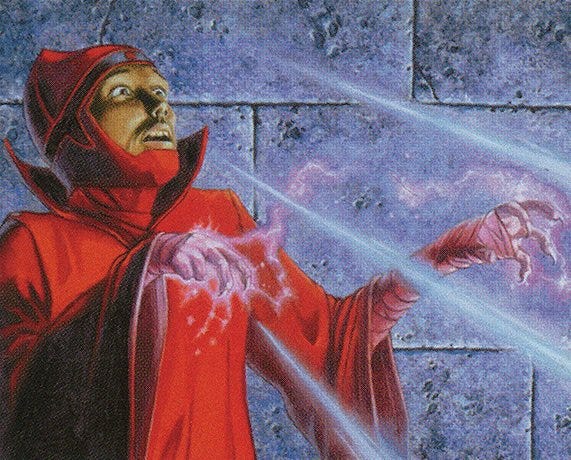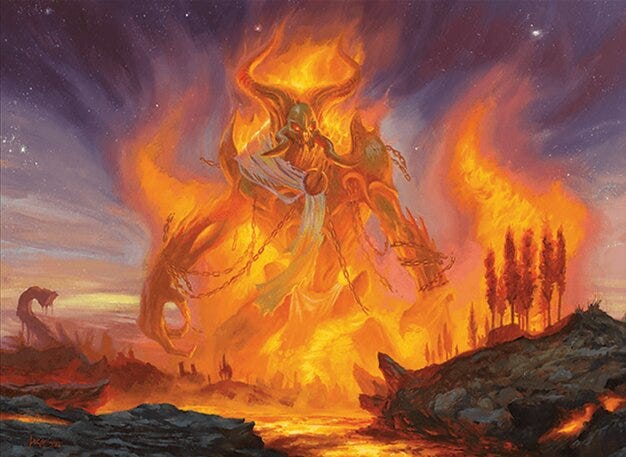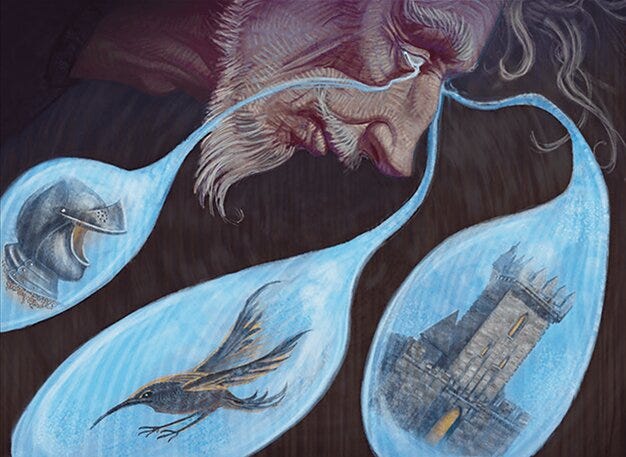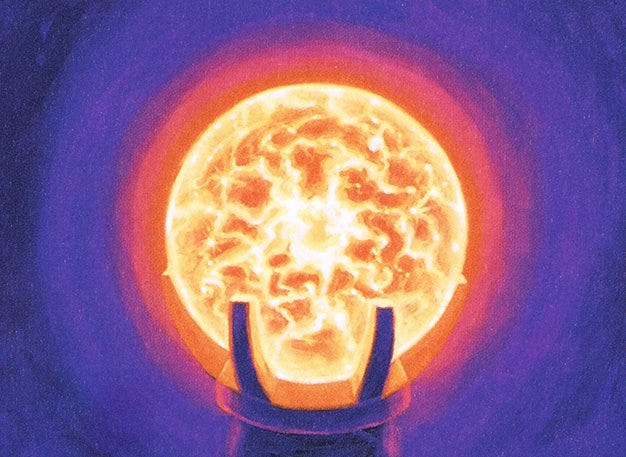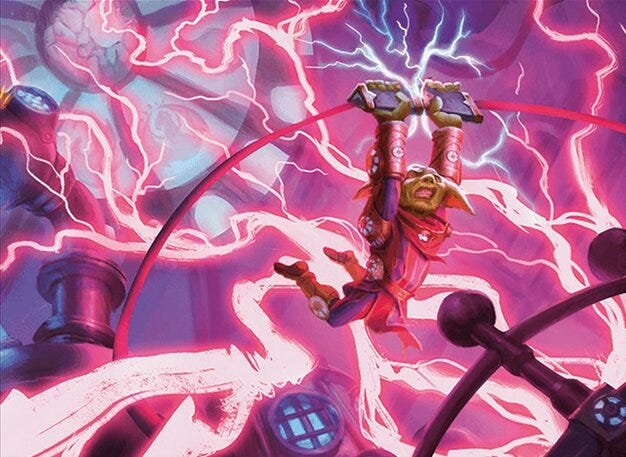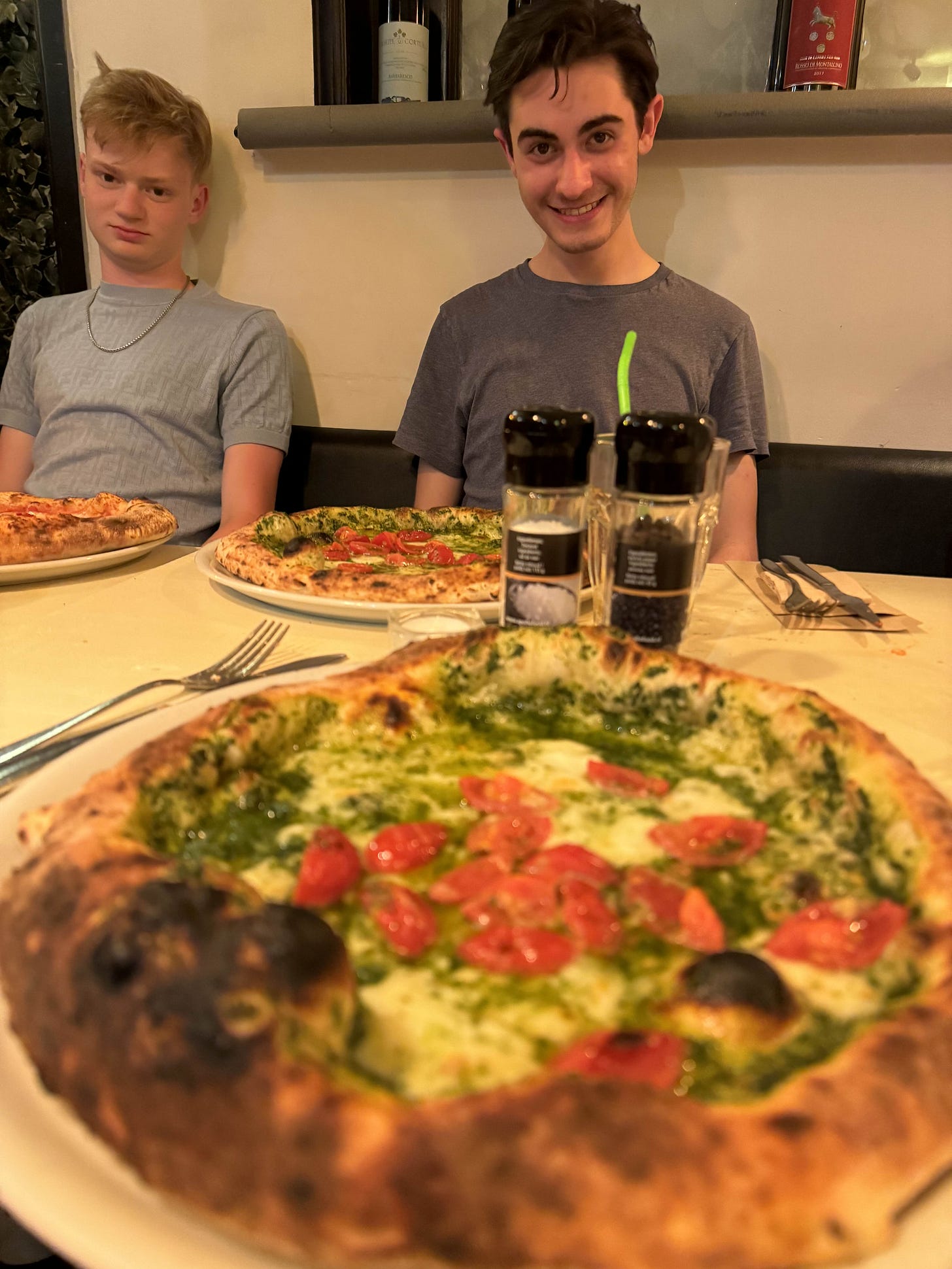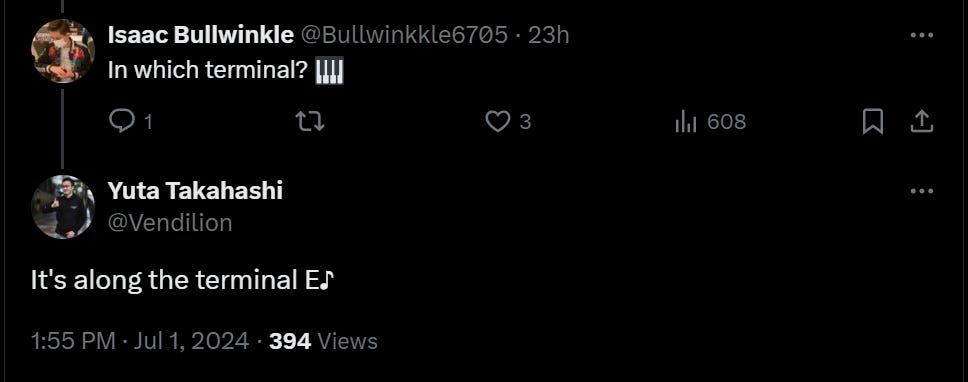the world is everything there is: stories from Pro Tour preparation and a GP Top 4
Hey everyone! I’ve decided to write a piece about my time in the last couple weeks preparing for the Pro Tour with Team Handshake and playing in the Modern 75K Open at MagicCon Amsterdam. I hope you enjoy it!
Travel
My journey began on Monday, June 17th - I headed to the airport with the plan to spend a couple days in the city catching up with a friend before migrating to the Team Handshake testing facilities to begin the tireless but fascinating process of preparing for the Pro Tour.
Upon boarding my plane, I was met with a very serendipitous surprise: a message from Henry Mildenstein, a former Magic player and community member as well as a very good friend of mine.
Henry and I quickly exchanged itineraries and discovered that we both had several hours of layovers at Chicago O’Hare airport before moving on to our connecting flights - his to Portland, mine to Amsterdam. Luckily, I had just the plan for us: it was time to battle Jace vs. Chandra duel decks in the airport.
Henry left to board his flight about 90 minutes before I had to do the same, so I spent some time admiring a picturesque view of the tarmac and following the departing flights on Flightradar24 before it was finally time to head to my gate. I quickly felt excitement building as I traversed O’Hare’s underground tunnel of electric light tubes - I was about to reunite with friends both old and new, give my efforts in assisting the best team in the world, and compete in my own tournament with hopes of joining my teammates as a competitor at the first Pro Tour of 2025.
Unfortunately, I don’t tend to sleep well on transatlantic flights, and this one was no exception - I realized shortly after the cabin lights were turned off that I had foolishly packed my melatonin in my suitcase rather than my backpack, so I resigned myself to the seven hours of suffering ahead by rewatching one of my favorite movies, Everything Everywhere All At Once. Eventually, I landed at Schipol airport, made it through European immigration, and finally crashed on the bed in my hotel room.
After a short couple days in the city spent sightseeing and resetting my circadian rhythm, it was finally time to head to the testing house(s) located in the Europarks Poort van Amsterdam, a collection of properties located just outside the main metropolitan area. This time, we had thirteen members playing the PT plus Nathan Steuer and me, so we rented three connected small houses in which to conduct the testing process. This was a similar setup to the one we used in Chicago for PT MKM, and it worked similarly well this time - the houses even gave us a constantly lovely view across the water towards the Dutch city of Almere. As everyone started to trickle in, rigorous testing began in short order.
Preparation
The first order of business for the team was to use experience and practice to develop an accurate conception of all our options with regards to constructed. Personally, I was enticed by the newfound power and reliability given to the Eldrazi Tron deck by Ugin’s Labyrinth, Devourer of Destiny and Kozilek’s Command, so I created a decklist with which I was doing decently well in testing against the gauntlet of decks we expected at the Pro Tour.
This was a deck that attracted me by its consistent proactive power generated by quick lockpieces into powerful payoffs, and in testing I was able to achieve a slightly favorable record against Nadu by adapting the strategy of constantly plussing Karn to buy time against Shuko while I set up Emrakul to steal all of my opponent’s creatures. However, as time went on, I came to the conclusion that while Eldrazi Tron was a strong deck in its own right, Nadu was simply stronger - if ETron was appealing for the same reasons Nadu was appealing (proactive strength), it simply wouldn’t make sense to register the deck.1 So, a few days after arriving, I gave up the Eldrazi deck and joined the dark side.
Throughout our process, there was always a large contingent of likely-Nadu players which started with Karl Sarap, Stefan Schütz, Julien Henry, and Jonny Guttman but grew in size with the addition of Eli Kassis, Chris Larsen, Simon Nielsen, Matti Kuisma, Alex Friedrichsen, and myself. Throughout our preparation we were extremely hard-pressed to find a typical ‘bad matchup’ for the deck, a virtue which gave it a Hogaak-like appeal to many members of the team who rightfully saw it as the most abstractly ‘broken’ choice.
Having played against Nadu with several other decks, I joined the contingent with some cautiously optimistic ideas on how to improve our version of the deck. One idea I’ll highlight came after I played some particularly interesting post-sideboard mirrors against Julien: to play a second copy of Bristly Bill. I presented this idea with two methodological arguments: one of structure, the other of specificity. In terms of structure, I argued that Bristly Bill contributes well to the deck’s functionality - it’s a threat by itself which is also a green creature to help convoke Chord of Calling, and the landfall ability represents more ways to trigger Nadu for profit. The specific applications I referenced came from my experiences watching and playing postboard games against Jeskai Control, RW Energy, and the mirror: against Jeskai, we found it was critical to pressure the opponent without overextending into Wrath of the Skies, and Bill facilitated that strategy well by being a threat in and of itself; against RW Energy, Bill’s ability to trigger Nadu was critical because it allowed you to trigger Nadu without activating Shuko (which was important against Shuko-hate such as Harsh Mentor and Wear//Tear); and in the mirror, Bill was nice for a similar reason - Shuko was often removed by disenchant effects such as Haywire Mite and Force of Vigor, so Bill could facilitate a resilient combo through interaction, especially when combined with Sylvan Safekeeper.
My arguments were received well, and the team actually ended up registering two copies of Bristly Bill! Of course, I had other ideas which didn’t end up coming to fruition (for example, I really liked how Shifting Woodland played against Jeskai and Necro, and I wanted to play a second copy to sideboard in against those decks), but it’s contributions like this one which make me feel at home among a group of players whose tournament finishes dwarf my own by several orders of magnitude.
Not everyone was on board the Nadu train, though. Throughout testing, Javier Dominguez was working on all sorts of other decks - among the more interesting ones were Tron with maindeck Stone Brain, UB Necrodominance with Psychic Frog, and the Jeskai pitch-control list with 4 Force of Negation and 4 Subtlety that he and three other team members ended up registering in the Pro Tour. While Tron and Necro were dismissed after their time in the kitchen, Javier’s Jeskai list just wasn’t losing to any of the top decks we expected at the Pro Tour, and even boasted highly favorable testing results against Nadu, Ruby Storm, and the pseudo Jeskai Control mirror. Eventually, due to witnessing the deck’s success and Javier’s confidence in it, I came to my own tentative conclusion that it would be a better choice than Nadu in the PT, so I shifted my efforts towards helping those in the Jeskai camp. When Wednesday of deck registration came, our two camps were fully solidified with me among the proponents of Jeskai.
However, I was quickly forced to confront an extremely difficult crossroads: the circumstances for the GP were meaningfully different from those of the PT. Firstly, the GP was closed decklist, so I wouldn’t know what my opponents were playing - a troublesome proposition for a reactive and polarized deck like Jeskai. Secondly, the GP metagame would likely be a lot less condensed than the PT metagame, and I saw Jeskai as being favored against the top decks but potentially weak against the ‘Other’ category, with Nadu being passable or slightly favored against the top decks and incredible against Other. With Nadu being a proactive deck that is comparatively unconcerned about the implications of closed decklists, reason suggested that I should probably play Nadu.
But something wasn’t feeling right when I returned to the Nadu deck. I felt like the plans had changed (or I hadn’t fully grasped them in the first place) and I had a feeling of being out of my element that wasn’t present during the initial testing I had done with the deck. I couldn’t always explain my reasoning for the decisions I made in-game with the Nadu deck, and conversely I felt I had developed a strong conviction and understanding of the Jeskai deck. So, after switching four times on the Thursday before Day 1 of the GP, I finally locked Jeskai and began scrambling to get the cards I needed to play the deck.
After sharing an Uber with Nathan (who was also playing the GP, but with Nadu) to the convention center, I began running around the vendors to buy the last few cards I needed and find the very generous people from whom I was borrowing. Eventually I realized that I had located all but one card in the deck: the pretentious one-of Minamo, School at Water’s Edge. I went to the vendors to purchase it, only to see its mind-boggling €60 price tag - I decided the Otawara in my backpack would be a sufficient replacement. Sleeving all of my newfound cards as quickly as I could, I ran to the GP area and found my table at the exact start time, 11:30.2
Tournament Report: Friday Day One
I cruised through the first two rounds of the tournament with relatively few complications. In the first round, I was paired against 4c Control, a matchup that I knew would structurally favor me substantially due to the abundance of free countermagic I had access to. In the second round, I was paired against RW Energy and played poorly to lose game one, but rallied back in the postboard games by utilizing Wrath of the Skies and Phlage to great effect. 2-0.
I took my first loss of the tournament in the third round. I was paired against four-color Nadu, and couldn’t find a second white source for the Wrath sitting in my hand for the entire game until I was at three life and dead to a Bowmasters on my end step. In the postboard game, my opponent had a very strong draw which forced me to tap all my mana without the requisite protection, which he punished me for with a successful Nadu combo. 2-1.
With some of the wind taken out of my sails, I was horrified when my round four opponent played a Sakura-Tribe Elder on the second turn of the game. I was brought back to the testing house and could hear Javier’s voice: “you’re going to lose to, like, Valakut if you play a deck like this…”
I lost game one without much of a fight and thought to myself about how this would cause me to finally learn my lesson to register the most proactive and powerful deck in an open field with closed decklists. But I thought about the matchup more and looked to my sideboard for ideas - there it was, Consign to Memory. I realized that I could use Consign to counter The One Ring, I could use it to counter Primeval Titan triggers, I could replicate it against Valakut triggers. I used Consign and my own Ring to win game two easily and got out of my head, causing me to notice that I had made a small error during sideboarding: I had kept a Galvanic Discharge over a Supreme Verdict. Because of the eight blue pitch cards, it’s almost always correct to err on the side of keeping a blue card to pitch if you don’t have a perfectly efficient sideboard plan. In my case, I kept Verdict and it was actually the key to winning the game in a spot where Discharge would have caused me to lose: I used Consign to counter my opponent’s Titan ETB trigger and used Verdict to clean up the Titan and an Endurance that he had cast earlier in the game. And just like that, I had beaten the matchup which Javier had specifically highlighted to demonstrate the supposed weaknesses of the Jeskai deck - this win instilled a confidence in my deck that would remain all throughout the tournament. 3-1.
Everything went smoothly for me in the the next three rounds. First, I was paired against RG Eldrazi Breach - this was a very scary matchup and I had to play very carefully, but I eventually took it down by winning an Invert Polarity flip on an Ulamog (I think I would have won regardless, but this was a nice one). Next, I was paired against Thiago Rodrigues on RB Necrodominance, and after winning game one I was extremely fortunate to win a super tight postboard game which involved me drawing the only Celestial Purge left in my deck in a spot where any other card would have left me in a dubious position. In round seven I was paired against Will Hall on Yawgmoth, and despite the games being tight and me feeling unfamiliar with the matchup I was able to take it down. 6-1.
Unfortunately for me, the luck ran out in round eight - I was paired against Yawgmoth again, and my opponent assembled uncounterable Grists and Yawgmoths, Fulminator Mages under Soul Cauldrons, and well-timed Bowmasters for my Rings, causing me to lose what was a rather discouraging match to end the day at 6-2. I’d say that the difference between 6-2 and 7-1 in a tournament like this one feels approximately equivalent to the difference between 1-2 and 2-1 in a PT draft, which is to say that I was somewhat demoralized. However, my mood quickly brightened after hearing that Javier had finished the day at 7-1 in the PT - I was filled with motivation to take it down with him on the following day.
Tournament Report: Saturday Day Two
I wake up early on Saturday and wish Javier and Anthony luck as they leave our hotel room to play Day 2 of the Pro Tour. I normally have trouble falling back asleep in these situations, so I decide to get up and spend some time reflecting on how to best orient myself to advantage of the current opportunity. Only the Top 8 players of the GP qualify, and my 6-2 record puts me in a very precarious position - I have to win at least five out of six rounds today, and if I lose any of the first four I’ll likely be out of contention due to poor tiebreakers.
I listen through Van Cliburn’s recording of Brahms’ first Piano Concerto, a favorite of mine for its romanticism and effortless contrast between intensity and tranquility. The one aspect I dislike about traveling to Magic tournaments is that they take me away from my artistic outlets - I’m a pianist and cellist, and since coming to Amsterdam I haven’t been able to practice for two weeks. Listening to Cliburn play Brahms at least helps me clarify my thoughts, and by the end of the piece I feel ready to conquer the tournament in front of me.
The first two rounds of the day go very smoothly once again. First, I play against Thomas Mechin, a Frenchman who loves to play control decks. Having watched Javier play the pseudo-mirror for hours on end, I feel pretty comfortable with this matchup. Mechin is a strong player, but the structural advantages of my deck are simply too much for him and I win in two games. In the second round I play against Nadu once again, and win without much trouble as Wrath of the Skies does its thing. 8-2.
My heart sinks a little bit when I see that my round eleven pairing is Martos, who I know is on ETron. Having tested this matchup from the Tron side against Javier with surprisingly mediocre results, I know that it’s not a horrible pairing for me by any means. There’s just something menacing about playing against Tron with a control deck that strikes fear into my veins.
The first game of this match was incredibly complex, and I’m very proud of how I navigated through it. I mulliganed to five on the play, and Martos was able to resolve an early Trinisphere that really constricted my ability to function properly. I was on thin ice for the entire rest of the game, as Martos assembled a large resource advantage by assembling Tron and using Kozilek’s Command to dig through his deck. However, I was able to make sure he never resolved a One Ring, and I used the Powerstone tokens he gave me from a Cityscape Leveler to resolve my own Ring with three mana up for a counterspell. From there, I chained Rings while making land drops and countering his threats until I could burn him out with Phlage.
Game two demonstrated one of the most disgusting sequences I’ve ever carried out in a game of Magic. Martos had assembled all three Tron pieces, and he cast a big Kozilek’s Command on my end step - I countered it with Force of Negation. He then untapped and cast a One Ring, I Commandeered it, one card left in my hand and one mana left. Martos cast Karn, hoping to shut down my stolen Ring and win the game, but I Consigned the Karn to Memory, subsequently untapping with the One Ring and drawing everything I needed to win the game from there. Oh Commandeer, how I love you so much. 9-2.
Round twelve was equally as insane as the one before it. I was paired against Necrodominance again, this time the version with Profane Tutor and One Ring instead of more scam elements and creatures. This matchup is another one that I played against Javier, but I felt insecure as it’s one that I found was almost completely dictated by the strength of each player’s opening hand and draws in the first few turns of the game.
I mulliganed to four and lost trivially in the first game after none of my first three hands included a land. I feel it’s very important to maintain composure when things like this happen - my tournament was on the line in an uncomfortable matchup, but I knew that my only job was to make the best decisions I could with the circumstances I was in. Luckily, game two was a relatively effortless win as I kept seven and utilized Phlage to clock my opponent before he could take advantage of his card-draw engines.
Game three was without a doubt one of the most tense games I’ve ever played in my life. Both my opponent and I had very strong opening hands - he played Phyrexian Tower and evoked Grief, I evoked Subtlety, he put Grief back on top and used it on the following turn to take my Celestial Purge, using the mana from Tower to suspend Profane Tutor. On his next turn, he deployed a land and an Orcish Bowmasters, annoyingly giving him two creatures to sacrifice to the Tower if he wanted to cast a One Ring or Necrodominance. However, things swung in my favor as I managed to win the Invert Polarity coinflip on his Profane Tutor, allowing me to search either for my own Ring or for another Polarity - I chose the Ring and was in a dominant position to win the game… or so I thought.
My opponent drew for turn and immediately slammed a land and his own One Ring as his last two cards - I was crushed, as I thought I wouldn’t be able to keep up with his Ring and Bowmasters. I resolved my own and started drawing, but my opponent quickly found a Necrodominance with his Ring and played it… my heart sank again and I thought that this was the end of my tournament as I lost an Invert Polarity coinflip on an Orcish Bowmasters that I thought was my last chance. But I kept playing and understood that the way I could win this game was by burning him out and hoping he doesn’t draw a Soul Spike or another One Ring in more than ten draws to basically kill me immediately. Everyone is gathering around the table as we’re the last match in the round. He draws and draws and draws and… passes the turn! I play Teferi, still in disbelief that I seem to be winning this game - it resolves, and all I need to do is fade one more draw until he dies to his Ring. He draws and extends his hand, and relief and excitement flow through me like never before. If I won the next round, I could easily draw into the Top 8 - I had a win-and-in for the Pro Tour once again.
My opponent is friendly, from a small town in Italy. He’s on a RB Shadow brew, and I calmly win the first game. The excitement is building, but I remain composed as I keep a fantastic hand in game two. Everything is going swimmingly as my opponent mulligans and sighs as he sees my hand with a Thoughtseize. In short order, I resolve and untap with a One Ring and nine life - all I need to do is find an answer for his creature, and that’s what I do, surveiling a Counterspell into the graveyard because I just needed an answer to the board. I pass the turn at eight, Subtlety and Spell Snare in hand for any creature. I thought it was all over.
My opponent draws and Thoughtseizes me, realizes something and quickly takes Subtlety. I don’t understand - what could possibly kill me from this position?
He plays a 6/6 Death’s Shadow. OK, resolves. He starts moving cards from his graveyard into exile and pronounces “Bestow Detective’s Phoenix on Shadow, attack for eight!”
Again, my heart sinks into my chest. I thought I was completely winning. I didn’t even know this card existed, and I milled Counterspell. Should have paid more attention to the limited meeting.
I silently pick up my cards, shuffle up for game three, mulligan, keep a mediocre hand, die horribly to a Grief scam + Ragavan hand. 10-3.
The next round is a blur. I play against Nadu and collect myself properly to win and ensure that I’ll at least be in the Top 16. Then, people start coming over to me, telling me that they think I have good chances. I check the standings, and sure enough I actually have half-decent tiebreakers. Martos and my opponent from the last round have both won their matches. Is this enough to propel me into the Top 8?
I’m not the only one sweating breakers for this Top 8 - another friendly Italian beckons me over to wait with him and his friends, and we all stand together to experience the biggest sweat we’ve ever had in our lives. I madly refresh the pairings, oscillating between thinking I’m in and thinking I’m 9th.
On MTGMelee, there’s always a minute between the reporting of the last match and the publishing of the next round’s standings. It comes, and everyone is quiet. Around me, I feel the arms of people who don’t know my name and don’t know where I’m from, and I don’t know their names or where they’re from, but in this moment they know me and I know them better than anyone else could.
Finally, it comes. I’m 7th.
I run back to the PT stage and arrive just as Javier wins his win-and-in for the Pro Tour Top 8. He points to me and realizes that I Top8’d, too, and runs over to celebrate everything that we’ve accomplished and that the team has accomplished. Soon, we get confirmation that both Simon and Eli are in the Top 8 with Javier, cementing this Pro Tour as one of Handshake’s best performances of all time.
The next few hours were a blur of euphoria and relief for me as I caught up with team members and watched on as the PT Top 8 became fully fleshed out by an array of incredible players. Soon enough, it was time for the Top 8 announcement, so I made my way to the feature match area to cheer on Javier, Simon, and Eli. What I found at the stage, though, was Billy Jensen standing at a podium looking incredibly somber and Kai Budde watching on with what I would soon learn to be unbelievable stoicism.
It didn’t take a long time for the tears to come as Billy described the incredible impact Kai has had on the game with conviction, grace, and sincerity. It was an honor to see and hear his speech in person on a day when Magic was so meaningful for me, and I think that naming the Player of the Year trophy after Kai is an incredibly fitting way to honor his legacy. It’s moments like these that cement my belief that Magic is the greatest game in the world and make me to feel so lucky to be a part of this community. Oh, and I think it’s truly so poetic that Kai won the Sunday PTQ - he simply never loses on Sundays.
After collecting myself after the Kai announcement, I go out with a few non-Handshake friends in Levi, Julian, Luca, and Ryan (WingedHussar), and we enjoy some amazing pizzas and the city’s scenic canals.
Sunday: GP and PT Top 8
I arrive to the convention center a little earlier this time to watch the match between Javier and Simon while waiting for my Top 8 to begin. Just as Simon wins, I’m beckoned to the Pro Tour area to take pictures and begin. I’m paired against a friend and fierce competitor in Andrew Elenbogen on Ruby Storm.
After we all agree to make the Top 8 open decklist, I notice that Andrew is playing a similar list to the one Allen Wu played in the Pro Tour - importantly, his only two win conditions in the maindeck are two copies of Wish. After discussing Allen’s list with Anthony and Javier the night before, I know that all I need to win game one is two copies of Force of Negation, which I find after mulliganing a mediocre first hand. I let Andrew combo off while sandbagging my Negations, and he realizes that the writing is on the wall when I exile the first Wish. Having surveiled a Phlage into my graveyard earlier in the game, we both know that there’s no way for me to lose a fair game, so Andrew packs it in when the second wish enters the exile zone.
The sideboard game doesn’t go any better for Andrew. I resolve a Drannith Magistrate to invalidate his Divinations, and play a Ring with FoN backup to ensure the most reliable victory. I advance to the semifinals.
I’m paired against Arch Dota, another friend and someone who I’d also been talking to and bantering with throughout the tournament. They were on Nadu, so I went into the match with high hopes that became quickly ruined by my own ignorance - I played pretty badly in both games one and three to lose a match that I should have had substantially better chances in. I would later determine that I had a gap of knowledge with regards to playing the Nadu matchup from the Jeskai side because I had still been part of the Nadu camp when Javier was testing against the deck with Jeskai, so I never watched him play the matchup and thus never learned how best to do so myself.
4th place.
I got over the loss pretty quickly and spent the rest of the day contenting myself by watching Simon win the Pro Tour, an achievement that is so incredibly deserved and has been coming for a very long time. I was even able to celebrate with him and the team on the main stage, and am more motivated than ever to make sure we get to do that at every PT. Later that night, we had a fantastic team dinner and spent hours celebrating until we were too tired to traverse the streets of Amsterdam any longer.
Aftermath
So, now I’m qualified for the first PT of 2025. I guess I finally have to actually learn how to draft, I should get on that before I have to go back to school. Until then, I’ll probably go to the American RC in DC and maybe even Worlds too. Regardless, if you’ve made it this far, I truly appreciate it and I hope that this very long-winded story has given something to you.
This is certainly the most personal Magic piece I’ve ever written. It’s my intention to approach this rhetorical space from a more artistic perspective, as I feel that Magic writing is often dominated by concreteness and monotonous rationalism3 that feels at odds with my own experience (and perhaps others feel the same way, too). I do think that these things are very important still — it’s not possible to be an exceptional player without knowing to use proper logic and argumentation — but I think that this space deserves to have its horizons expanded in a different direction, and this is my attempt to contribute to that expansion.4
I’ll return to the US tomorrow, but for now I need to find a pub in which to watch Netherlands vs. Romania with the locals.
After that, only one more destination remains.
Of course, there are some exceptions to this line of logic. A deck’s strength takes its resilience to ‘hate’ into consideration, and for example if we expected substantially more Nadu hate than Tron hate it could make sense for us to change our conception of these decks’ comparative strengths. However, this wasn’t the case due to two reasons: firstly, we were stress-testing Nadu against decklists with an abundance of hate — perhaps even more than we were expecting at the PT — and found that it was super resilient and strong through all of it. Secondly, it’s not like we expected people to skimp on Tron sideboard cards - Necro lists published by PT players frequently included many copies of Break The Ice, and various fair blue decks published in the weeks leading up to the PT always had several copies of Consign to Memory in their 75s.
More tournaments should adapt this policy of starting events later than 9:00 or 10:00 AM - it was a complete lifesaver for me as I otherwise wouldn’t have enough time to gather and sleeve the requisite cards for my deck. I also like to have some time to sleep sufficiently and reflect on calming myself and focusing intensely on the game, and I always feel either super rushed or too tired to compete properly. Obviously, for tournaments like the US RC it’s not practical because the rounds last far too long, but the late start time was a big quality of life improvement for me here and I really appreciated that.
Not to mention the fact that the Magic writing space has become almost completely dominated by single-use, purely strategic content because that’s what is monetizable. This is a topic for another article (I myself have written and sold such content and understand its importance) but all I’m saying here is that I wish there were more tournament reports like Matti Kuisma’s for PT MKM, which was a large inspiration for this one.
For better or worse, this approach was greatly influenced by the writing of four authors in specific, and this is in no particular order: Allen Wu, David Foster Wallace, Maggie Nelson, and of course Ludwig Wittgenstein (regarding the title of this article, I know about the Ogden/Ramsey translation - I prefer this one by Damion Searls).











